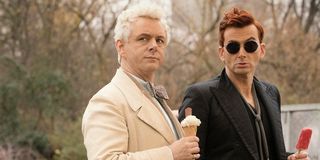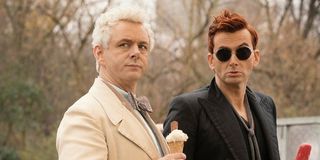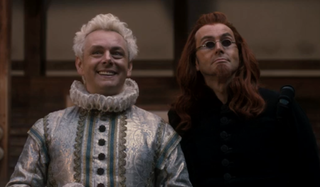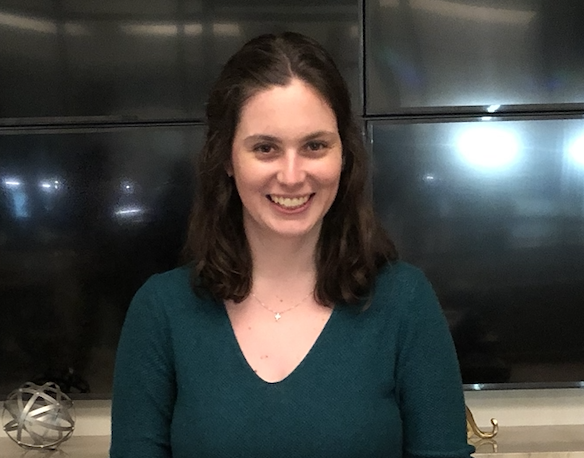Why One Of Good Omens' Best Scenes Almost Didn't Happen


Spoilers ahead for Amazon's Good Omens.
The long-awaited Amazon adaptation of Good Omens has finally made its streaming debut, and the six-episode series was a wild ride through history, the apocalypse, and literal planes of existence as an angel, a demon, and a handful of humans tried to avert the apocalypse.
Based on the book of the same name by showrunner/writer Neil Gaiman and the late Terry Pratchett, Good Omens stars David Tennant and Michael Sheen as the demon Crowley and the angel Aziraphale, respectively. The show actually fills in some blanks in the characters' histories from the book.
In fact, the whole first half of the third episode is devoted to showing some pivotal scenes of Crowley and Aziraphale's relationship through the millennia. The scenes ranged from hilarious to heartfelt to downright goofy.
As it turns out, one of those scenes wouldn't have happened at all if not for a certain twist in the production process. Good Omens director Douglas Mackinnon and writer/showrunner Neil Gaiman spoke to CinemaBlend and other press outlets at a recent junket, and they said this about one of the best scenes of the series:
Douglas Mackinnon: So there's a scene in Episode 3 where we go to the Globe Theatre to see the first week of Hamlet. Neil originally wrote that scene, it was the first week of Hamlet and it was a huge hit. Place was packed out with 500 people. My team got access to the Globe Theatre for the first time in history to film in there, but they could only get us five hours. I said to Neil, even if we could afford it, we won't get 2000 people in and out of the Globe Theatre in period costume and everything else. So he rewrote the scene better and made it the first week of Hamlet and it's a dud, and nobody's coming. Nobody's turned up. And suddenly you see the architecture of the Globe. It's a great gag. And you see David and Michael.Neil Gaiman: Reece Shearsmith plays Shakespeare.Mackinnon: And we see an actor on stage playing Hamlet, saying the words 'To be or not to be,' and they're not working.
The Globe Theatre is an iconic location in London thanks to being featured in various high-profile productions as well as the history books. While many projects have at least had characters visit the Globe (or a set constructed to look like the Globe), filming at the actual Globe Theatre is clearly still a very big deal.
In the third episode of Good Omens, Aziraphale and Crowley visit the Globe circa 1601. Despite modern expectations that a show like Hamlet would draw huge crowds, Good Omens revealed a reality in which folks of 17th century England didn't care for Shakespeare's tragedy. Crowley, for one, was not a fan of the "gloomy" plays and preferred Shakespeare's comedies.
CINEMABLEND NEWSLETTER
Your Daily Blend of Entertainment News
As originally scripted, the scene was evidently packed with people dying to see the young Prince of Denmark, whereas the finished product had only Shakespeare, an actor playing Hamlet (and feeling unappreciated), Aziraphale, Crowley, a concessions seller, and a few random and bored theater-goers.

Packing the Globe with more than a thousand people in period costume for a 21st century production in less than five hours just wasn't going to be possible. So, we didn't get Crowley and Aziraphale blending in with the packed house at the Globe Theatre in the first week of Hamlet.
Instead, we got Hamlet as a flopped production, with pretty much only Aziraphale as a fan. If the production was allowed to continue without any supernatural interference, the Hamlet of the Good Omens universe might have been one of Shakespeare's least memorable plays.
Instead, after Aziraphale lost a coin toss that meant he had to go to Scotland to do a blessing for Heaven and a temptation for Hell to spare Crowley the trouble of riding north, Crowley agreed to perform a miracle and turn Hamlet into a hit while the angel was away. The Arrangement saved Hamlet in a very unexpected (and quite hilarious) way. Can anybody really argue that the original scripted scene in the Globe Theatre would have been better than the finished product?
Neil Gaiman went on to explain why the scene was such a success and why his late Good Omens co-author Terry Pratchett would have been pleased with the adaptation that never quite got off the ground before he passed away. Gaiman said this:
And the one thing that Terry Pratchett wanted most in a director was somebody when the money ran out, they could use their ingenuity. And I have to say, channeling Terry here, that Douglas did that absolutely. Using ingenuity when there's no more money.
Not many shows have the advantage of the same writer and the same director handling every single episode, to the point that it feels more like an extended movie split up into sections rather than a season made of disparate parts. Neil Gaiman was clearly pleased with what Douglas Mackinnon brought to the table as director of all six episodes, and the Globe scene is an example of a potential disaster turning into something wonderful thanks to some tweaks.
It was a collaboration between the two, and it resulted in one of my favorite scenes of an episode packed with wonderful sequences developing Crowley and Aziraphale. Of course, for fans who have already watched all six episodes of the season, it may come as a surprise that the show had to stretch to stay within its budget. After all, everything from David Tennant's supply of wigs (which can be terrible on TV) to Heaven and Hell to the literal apocalypse looked great.
Douglas Mackinnon and Neil Gaiman weighed in on the challenges of putting together such an ambitious series as a Good Omens adaptation with the available resources:
Douglas Mackinnon: We land at the top end of television drama budgets but the far, far bottom end of your Guardians of the Galaxy, DC, Marvel budgets, but we're trying to make it look like it's the top end. It's something that's a struggle. We had 17, 18 days per hour to make this, whereas Guardians of the Galaxy, we'd've had 150 days to do the thing. It's just a balancing act there. And at the end, what we had to do, we were at the top end of television and yet we kept on running out of money and kept on pushing the ambition, as you always do, higher and higher and higher, because the storytelling is so complex and rich and beautiful and everything else. As a director, I didn't want to miss a moment that Neil had written, and he didn't want to dump anything.Neil Gaiman: We had one producer in the early days who kept sending us emails, rather frantic and worried emails, explaining that we had to reduce the size of our ambition. We could not be so ambitious. We just simply had to curb our ambition. So we said goodbye to that producer... We thought there were two ways to do this, and shooting for the stars is the only way.Mackinnon: Absolutely. If Plan A couldn't be afforded, instead of moving to Plan B we went to Plan AA.
Fortunately, Neil Gaiman, Douglas Mackinnon, and the rest of the Good Omens team were able to figure out ways to adapt without entirely altering the message and plot of the source material. Of course, it had to help that the co-author of the source material was literally on board as showrunner and writer, so even tweaks to scenes like the Globe sequence felt like they fit the tone and flow of the rest of the series.
Did everything go as originally planned? No. Did that make the show any worse? Definitely not. If you haven't caught Good Omens yet (or just want to rewatch), you can find all six episodes streaming on Amazon now.

Laura turned a lifelong love of television into a valid reason to write and think about TV on a daily basis. She's not a doctor, lawyer, or detective, but watches a lot of them in primetime. CinemaBlend's resident expert and interviewer for One Chicago, the galaxy far, far away, and a variety of other primetime television. Will not time travel and can cite multiple TV shows to explain why. She does, however, want to believe that she can sneak references to The X-Files into daily conversation (and author bios).
Most Popular



